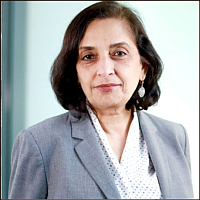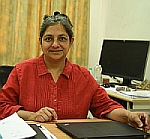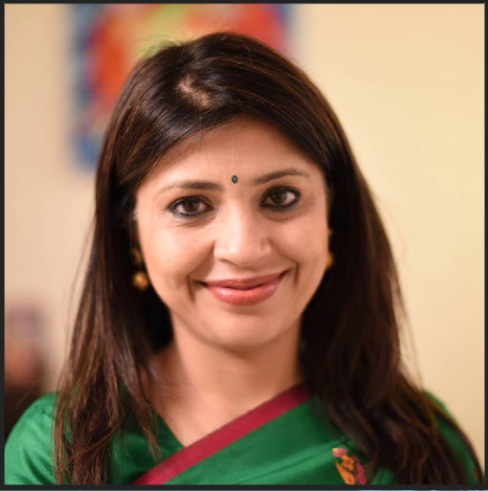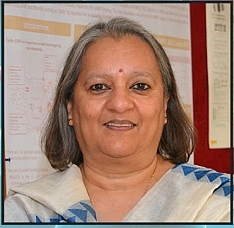
Dr. Sudeshna Sinha, Deputy Director, IISER Mohali
Dr. Sudeshna Sinha is a professor in the Department of Physics, and also serves as the Deputy Director at the Indian Institute of Science Education and Research (IISER), Mohali, India. She completed her five-year integrated master's in Chemistry at IIT Kanpur in 1985. She primarily works in the area of nonlinear physics. Dr. Sinha is one of the inventors of a revolutionary computing technique (Chaos computing) developed commercially by the US-based company, Chaologix. She is a recipient of the Birla Award for Physics and was also conferred the J.C. Bose National Fellowship. She is also an elected Fellow of the Indian Academy of Sciences (IAS), Bangalore, the Indian National Science Academy (INSA), New Delhi and The World Academy of Sciences (TWAS), Trieste.
In an interview with the DoRA Office, Dr. Sinha talks about her research, challenges, IITK days, and much more.
You started your career with a master's in Chemistry at IITK; then, you specialized in research in nonlinear physics. You are also one of the inventors of chaos computing and an expert in complex networks - you have covered a vast domain in your career, take us through your journey, and what motivated you to explore new domains constantly.
Nonlinear dynamics is actually a truly interdisciplinary research area, and draws researchers from domains ranging from applied math, physics, chemistry and biology to the engineering sciences. The interdisciplinarity of this field really appeals to me, and my broad-based IITK training enabled me to pick up whatever new techniques I needed along the way. In research, the question you want to address is central, and one should try to use whatever techniques one needs to make a headway in addressing the question. So the more open one is to ideas and techniques in different disciplines, the greater is the chance for making an impact. The significance of the results may also lie outside one’s discipline, and one has to be alert and grab those potential applications.
What inspired you to pursue Ph.D. and become a faculty member over a corporate job as a career option? What aspect of your work appeals to you the most?
Academics is more than a profession, it is a way of life. You get to do what you love most and get paid for it! Importantly, a career in academia is not a sprint, but a long distance run… One of the appealing things about academia is that in some sense it is truly without borders. When one writes a paper, it is read by researchers around the globe and there is no greater thrill than knowing you have reached people beyond those you have met or will ever meet physically. It is one of those professions that offers an opportunity to leave a footprint (however small) for posterity in the intellectual landscape. It is also a profession that is intrinsically non-hierarchical. You own your time and your sense of worth is not just determined by your place in a specific organization. Lastly, academics involves teaching, and being around vibrant young minds, though hard work, is always stimulating and keeps one more free-spirited.

Fellow of the Indian National Science Academy Award, 2014
You have done your Ph.D. from Tata Institute of Fundamental Research, Mumbai, and were an Associate Member, International Centre for Theoretical Physics. What do you feel are the differences or similarities in the Indian and International research systems?
I perceived no real difference in the environment of TIFR and ICTP. I feel that world-class places, irrespective of their geographical locations, are not very different. The difference in the life outside the bubble of an institute can of course be quite stark.
What have been the biggest challenges in your career, and did your experience during your bachelor’s at IITK help you overcome obstacles you faced in any way possible?
The biggest challenge in my career was coming back to academia after childbirth and regaining the confidence that one could function again at the level one left off. Here the basic issue is to accept that the break enforces some drop in productivity, and that is absolutely okay. One just has to muster the will and strength to get back to research, and maintain a balance between rushing back to work and giving oneself the space to be comfortable with motherhood. Now the rigours of IITK had made me extremely resilient and this deep-rooted mental toughness helped me not give up after the professionally lean period that naturally follows the child-bearing year(s).
How did your life at IITK shape your interest and help you decide your career path?
One of the most important things IITK taught me was the confidence to learn new things. Basically we “learnt how to learn”. The attitude to the process of learning that we imbibed, not merely the course content, allowed us to be more adventurous and helped us evolve with the demands of our different professions. Personally, I changed fields during my PhD, and this lesson of fearlessly jumping into new subjects came in extremely handy. Also, the truly broad-based education imparted by IITK provided an invaluable foundation for my academic path. The forward-looking curriculum of IITK was at par with the best offered globally.

Elected Fellow, The World Academy of Sciences (TWAS), 2018
Did you face any challenges due to the low gender ratio during your college life or further in your career? What do you think is the reason for a low gender ratio in IITs and the IISERs, and what impact does it have on women in research and innovation?
Well, the gender imbalance was indeed absurd in our time (there were just five of us in the entire batch). However, I must say, I never felt singled out by the faculty due to my gender. I always felt I got what I deserved - both the good and the bad grades. At a personal level, indeed it was very difficult to navigate an environment with such a skewed gender ratio. We devised ways to stay afloat and make an identity for ourselves that went beyond being “one of the girls”. Of course, this imbalance will not change as long as entry to the IITs is heavily dependent on intensive JEE coaching, as families are less likely to “invest” in coaching girls. In the long term, since the IIT network is a bit like a “boys club”, it may be harder for women to get a toe-hold in professions where networking is crucial to career advancement. I must add though that I always viewed my formative years in the severely gender-imbalanced IITK environment as an opportunity to gain (out of necessity!) valuable skill-sets to negotiate the delicate gender-based issues in the workplace later in life.
We usually hear many exciting stories of how the campus used to be in its early days. Can you share some of your memorable experiences at IITK?
As you know, in the early years, batch sizes were small (around 250 or so), and this gave campus life a somewhat different flavour. It was a tighter group, with more opportunity for closer interactions across the batch. I remember the excitement of organizing the Culfest - which was not the slick show it perhaps is now, but was nevertheless extremely vibrant and inclusive of a wide set of students. I loved the campus rags and theatre productions ranging from improvised skits to classic plays. I loved everything from FTII-run courses on film appreciation, to blockbusters in L7, with multiple “repeats” of sequences on popular demand! And then there was the experience of producing our own TV shows, where the glitches and bloopers added to the fun!
Are you still in contact with your friends from IITK?
Yes, I am in contact with some of my friends from IITK. Interestingly, I have renewed contact in recent years with a broader set due to the emergence of social media.
How do you think the pandemic has affected research work? What new methods did you adopt to make the best out of this situation?
It has affected teaching more than research. However, I believe it has also offered some opportunities to use technology in innovative ways to reach a larger audience. I think, going forward, we may retain some of these methods we have devised now out of necessity, even when the pandemic blows over.
What do you look for in students' applications for research internships? How can a student make his/her application effective?
We expect that the applicant is bright and academically sound - which most happen to be. But to distinguish oneself the student should convey his/her interest and excitement for something specific in the field of the potential mentor. Routine cookie-cutter SOPs that are too general and unfocussed (even if well written) do not work well.
What advice would you give to students who are inclined towards research on making the most of the college time?
Unfortunately, I feel that JEE these days warrants too much single-minded preparation. So I hear that IIT students are now, typically, a bit burnt out by the time they enter IIT. I do hope they keep the following in mind (and this is especially relevant for a career in research): entering IITK is not as relevant as the opportunity it offers for a wonderful education. Sometimes I feel students may have got this wrong these days, and think the entry into IITs is the real deal… No, it is the education that follows that is the real deal! So an entry to an IIT offers the student an opportunity to learn from the best, but it is not an end in itself.

At a seminar
How would you sum up your life so far? And if given a chance what would you have liked to change, either from life at IITK or your higher studies?
I have been fortunate in having the opportunity to do what I love, and love what I do. I do not have any regrets for any of the paths I chose, as they were all (even the unlucrative ones!) motivated by the desire to give myself opportunities to continue to do what I enjoyed the most.





